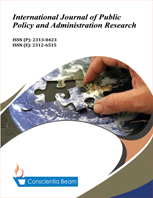Patriarchy, economic values, and tax morale in Indonesia
DOI:
https://doi.org/10.18488/74.v11i3.3875Abstract
This research aims to examine the influence of patriarchal ideology, economic values, age, gender, marital status, education level, employment status, and religion on the tax morale of Indonesian citizens. This cross-sectional research adopts a quantitative approach and utilizes World Value Survey (WVS) VII data collected in 2017. The respondents to WVS VII were 3,200 (three thousand two hundred) Indonesian citizens who were over 17 (seventeen) years old and spread across several provinces. STATA 17 processed the data and used logistic regression techniques for analysis. Researchers found that only patriarchal ideological orientation, education level, and religion had a significant impact on citizens' tax morale. Only patriarchal ideologies have a negative relationship with citizens’ tax morale. Researchers recommend that the government should intensify mass education on gender justice, enhance the quality of education, and support various religious institutions, particularly Islam, to instill religious values in society.

